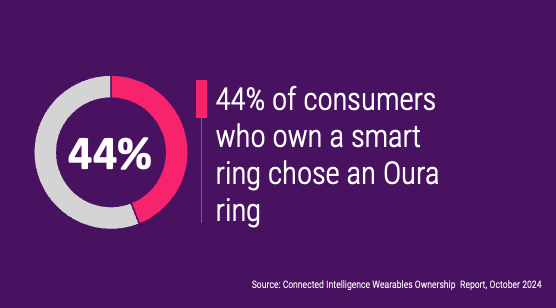
Oura doubles down on sickness tracking
Oura is officially launching respiratory sickness detection features after its previous Beta testing and Oura customers that have am active subscription should see the Symptom Radar feature pop up on the app starting this week. The idea behind the feature is that the Symptom Radar looks at metrics such as skin temperature, sleep data, breathing and heart rate to detect anomalies from the baseline stats. If there are, the app will let the user know that they may have cold or flu symptoms and offer suggestions for resting. Oura claims that the Radar can detect symptoms up to two days before the wearer may otherwise be aware they are ill.
The Circana Take:
- The solution is based on previous Oura work on Covid-19 detection which was a compelling purchase reason for many early adopters of the ring and it helps to differentiate the Oura ring from the competition which is key since there are a plethora of ring devices now hitting the market.
- To make use of the new feature, the owners need to be an active subscriber, which costs $5.99 a month. Adding the new Radar feature (perhaps) helps to justify the monthly subscription, and will pull in more existing Oura owners who have so far opted to avoid the paid service.
Humane pivots to software
Humane, the company that launched the AI pin, is pivoting to a software-focused future. The company’s Pin was a flawed device that has, to all intent and purchase, flopped and so the company is looking to evolve, focusing on the smarts inside the hardware instead. The idea is that the CosmOS software inside the Pin should be used inside a range of devices, such as cars, TVs and so on, so that CosmOS “follows” you everywhere you go by being a universally-available AI.
The Circana Take:
- In theory, the idea has merit and is a version of the future that we have been tracking for the past eight years, since we launched the first Evolving Ecosystem report. The concept that a voice interface should be the center of a consumer’s technology ecosystem is a compelling one. But… why CosmOS? The software has a key problem with the failure of the AI Pin and failed to meet up to expectations.
- Further, this is pretty much the exact definition of the competitive landscape that Apple, Google and Amazon (not to mention Samsung and others) are battling over with tier voice interfaces. And they already have the hardware installed in the home. As a result, while we are still very bullish on the idea of a voice-centric interface moving forward, Humane is going to struggle to make an impact in this market.